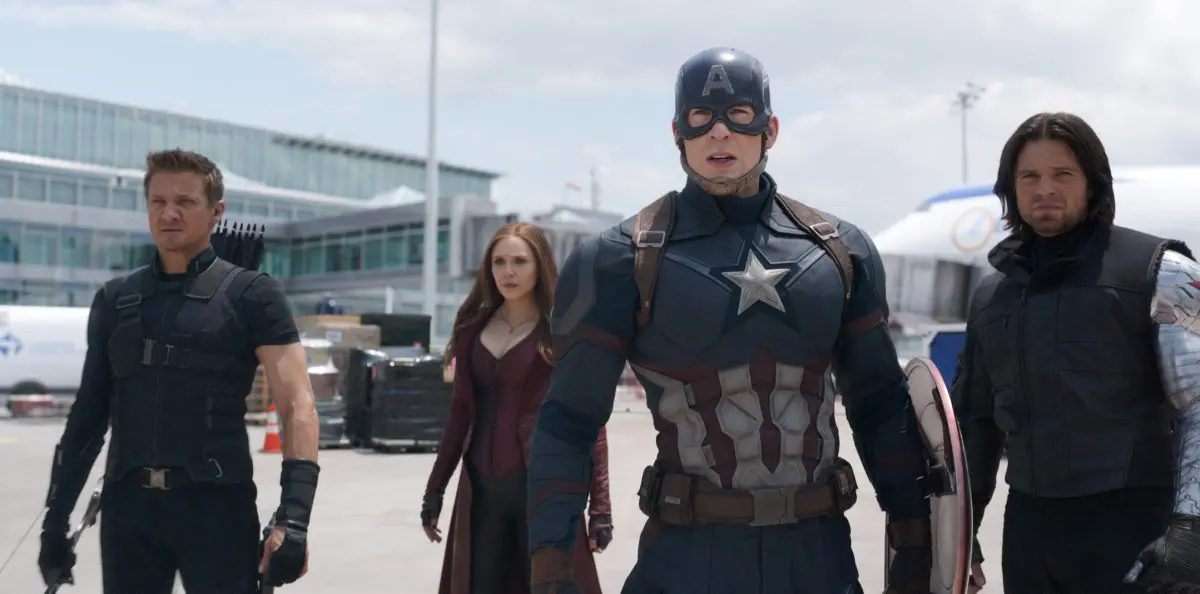Per Matt
As if employing a Choose Your Own Adventure marketing campaign, Captain America: Civil War promotes itself as a movie where superheroes are fighting superheroes and you, the viewer, must choose a side. It’s catchy and effective, but ultimately, it boils down to which characters you relate to the most.
Full Disclosure: Each of the Captain America movies, so far, have been my favorites within the Marvel Cinematic Universe. From the alternate history of Captain America: The First Avenger, to the hiding Hydra operatives within Captain America: The Winter Soldier and now, the good guys vs. good guys battles within Civil War, each of the titles have shared ground-breaking success that laid the framework for future Marvel movies and the latest release is no different.
Taking place one year after the events of Avengers: Age of Ultron, the superheroes now face repercussions for saving the world. While the villains were previously stopped in New York, Sokovia and now in Lagos, millions of innocents were killed as a result. Unlike the Civil War comics (which this movie is loosely based) that feature the Superhero Registration Act, the big-screen version features the Sokovia Accords, which states the superheroes will be monitored and policed by the United Nations. Naturally, this fractures the group. Doubt is planted into the heroes, questioning what is right and wrong. Feelings are hurt, friends are betrayed and this leads to a very long battle. No new Big Bads are introduced, but the good-vs.-evil battle proves there’s a little evil in all of us, no matter which side you choose.
Much of the movie revolves around Tony Stark’s misguided conscience (or there lack of), but the main takeaway from the film is the introduction of new characters into the Marvel Cinematic Universe. Black Panther (played by Chadwick Boseman) receives a brief backstory and Spider-Man (Tom Holland) finally joins the group, thanks in part to a partnership with Sony Pictures. The Winter Soldier (Sebastian Stan) receives quite a bit of dialogue, Vision (Paul Bettany) learns about human emotions and Falcon (Anthony Mackie) receives new cool Stark technology, while Scarlet Witch (Elizabeth Olsen), Ant-Man (Paul Rudd), War Machine (Don Cheadle) and Black Widow (Scarlett Johansson) do their best to fit in with the others.
Ultimately, Civil War is a clash between the A-type personalities of Tony Stark (Robert Downey Jr.) and Steve Rogers (Chris Evans), in a battle where there are no winners… and everyone suffers from the consequences. There’s plenty of battle damage to be distributed among the main characters (which will lead to some great action figures, by the way). Be on the lookout for Stark’s black eye, which grows and shrinks as a continuity goof throughout the film.
I was impressed with Tom Holland’s performance, even though his voice rises and drops a few octaves throughout the film. He may very well be the best actor to portray Peter Parker, yet. One noteworthy scene features three African-American superheroes sharing the screen in a Marvel movie. It felt natural and also monumental. Slowly but surely, more minority characters (as well as the actors portraying them) need to be better represented on the big screen. The open-ended conclusion of the movie sets up the future release, Avengers: Infinity War Part 1.
Don’t forget to stick around for the mid-credits and post-credits scenes, both of which will lead into the upcoming Spider-Man: Homecoming and Black Panther films, which I’m already eagerly anticipating.
Review: 4.5/5
